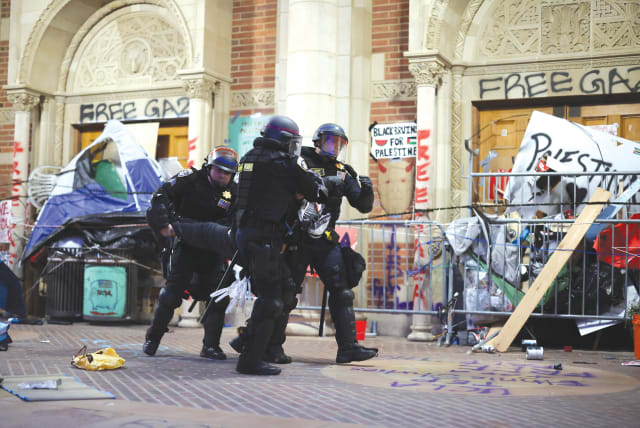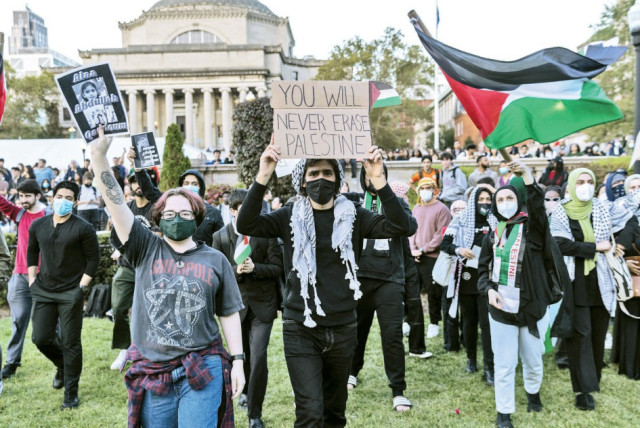Editor's Notes: Unmasking JVP, SJP: Pro-Palestinian terrorists on US campuses

Groups like JVP and SJP, under the banner of human rights and justice, often venture far beyond peaceful protest into realms that many find both morally and legally questionable.
In a tense showdown at the University of California, Los Angeles (UCLA), helmeted police officers moved in to dismantle a pro-Palestinian protest camp following clashes with pro-Israel supporters. The predawn crackdown on Thursday was the latest in a series of confrontations on US college campuses over Israel’s actions in Gaza. Officers in tactical gear entered the campus adjacent to a complex of tents occupied by demonstrators.
Despite efforts by protesters to block their advance, law enforcement eventually moved in to arrest those who refused to vacate the encampment. The incident underscores escalating tensions surrounding the Israeli-Palestinian conflict, with protests and clashes erupting across various American universities.
Earlier this week, more than 100 students were arrested at Columbia University when police were called to clear a pro-Palestinian protest camp, following Columbia President Minouche Shafik’s commitment to Congress to discipline unauthorized protests. This action, described as necessary due to exceptional circumstances, heightened tensions amid ongoing campus demonstrations, which some viewed as antisemitic.
In the cauldron of Middle Eastern politics, where every slogan and protest can reverberate with the sounds of distant gunfire, the alliances between Jewish Voice for Peace (JVP), Students for Justice in Palestine (SJP), and similar groups resonate with particular dissonance. These organizations, under the banner of human rights and justice, often venture far beyond peaceful protest into realms that many find both morally and legally questionable.
Incendiary actions and provocative statements
Take, for instance, the “Day of Resistance” organized by SJP, which JVP supported vocally and financially. This wasn’t just a rally or a call for policy changes; it was an event that included mock “resistance” scenarios mimicking violent uprisings. The promotional materials for this day featured images of masked protesters and calls to “dismantle Zionism,” imagery that could easily be construed as endorsing violent action rather than peaceful protest.
According to a study by the Diaspora Affairs and Combating Antisemitism Ministry, JVP’s own social-media platforms serve as echo chambers for these sentiments. A recent post on their Twitter feed declared, “From the river to the sea, Palestine will be free,” a slogan that has been criticized for implying the eradication of Israel. Whether intended or not, such statements contribute to an atmosphere where the line between criticizing government policy and negating the existence of a state becomes perilously thin.
JVP’s appropriation of Jewish rituals has also sparked considerable controversy. In a recent highly publicized event, JVP members recited Kaddish, the Jewish mourner’s prayer, not in a synagogue but outside an Israeli consulate for Hamas terrorists killed in war. This provocative act was broadcast across social-media platforms, drawing both confusion and ire from various quarters of the Jewish community who viewed it as a profound desecration of a sacred rite.
On university campuses, where SJP is most active, their operations often disrupt the academic peace. For instance, during Israel Apartheid Week, an annual event on many campuses, SJP has been known to erect “apartheid walls” and distribute flyers that liken Israel to apartheid-era South Africa. These actions not only skew complex political realities but also polarize student bodies, often leading to tensions that spill over into harassment or bullying of Jewish students.
Legal and ethical quagmires
JVP’s endorsement of groups such as Hamas, recognized internationally as a terrorist organization, poses significant legal risks. Their public solidarity with such groups at rallies and online platforms could potentially attract scrutiny under laws that prohibit material support to terrorist organizations. These legal boundaries are not merely bureaucratic red tape; they are in place to prevent the escalation of conflict and support for violence.
It is here, in the fiery speeches at rallies and the impassioned posts on social media, that the fundamental misalignment of JVP and SJP with the principles of true peace advocacy becomes clear. Their narrative is less about building bridges and more about stoking the fires of division. True advocacy for peace doesn’t come from amplifying conflicts or rewriting religious rituals as political statements; it comes from painstaking dialogue, understanding, and mutual concessions.
American students’ support for the Houthi terrorist group
Recent research by the Diaspora Affairs and Combating Antisemitism Ministry has illuminated a concerning trend: Some American students are actively supporting the Houthi movement in Yemen, which has been identified by former secretary of state Mike Pompeo as a terrorist organization. Although the Biden administration removed the Houthis from its terrorist list in 2021, ongoing attacks against civilian ships and military targets in the Red Sea have led to reconsiderations to redesignate them as a terrorist organization. Despite these actions, which include missile attacks against American, British, and Israeli targets and disruptions of global shipping lanes that escalate commodity prices worldwide, several student organizations seem to dismiss these violent acts as mere political maneuvers rather than recognize them as manifestations of radical terrorism.
This alarming alignment is not isolated. Organizations such as SJP, American Muslims for Palestine (AMP), and the Palestine Youth Movement – groups partially affiliated with Hamas – are noted for their support for the Houthi regime. These groups have participated in rallies and events, chanting slogans such as, “Hands off Yemen,” which not only ignore the Houthis’ radical actions but also contradict the official American stance on the matter.
For instance, at a notable event in Houston, these organizations, including JVP, came together to support BDS and other anti-Israel movements, signaling a broader coalition of student activism that often sidesteps the violent realities endorsed by their beneficiaries. Additional demonstrations in Chicago and New York have further echoed these sentiments, advocating for unrestricted aid to Gaza and positioning the Houthi movement as part of a broader anti-imperialist fight for justice.
This pattern of support raises critical questions about the responsibilities of student organizations in international conflicts. By choosing to support groups involved in violent actions under the banner of anti-imperialism, these students and their organizations risk endorsing a narrative that simplifies complex international issues and undermines global peace efforts.
In the saga of university activism, the conduct of groups such as JVP and SJP stands as a stark reminder of the thin line between fervent advocacy and outright endorsement of terrorist activities. These organizations, under the guise of fighting for human rights, have fostered a campus environment where extreme actions and views against the State of Israel and its supporters are not only normalized but celebrated. Their activities, such as mimicking violent uprisings and disrupting academic settings, have turned educational institutions into battlegrounds rather than places of learning.
The failure of university authorities and law enforcement to address these activities promptly has only emboldened these groups further. For two decades, these organizations have operated within university grounds, gradually escalating their aggressive tactics, while oversight bodies have either turned a blind eye or responded too leniently.
The police and campus security have often been too slow to dismantle these radical encampments and arrest those who break the law. This negligence has allowed a dangerous ideology to flourish – one that does not merely seek to criticize Israeli policies but aims to destroy the only Jewish state and, by extension, the Jewish people along with Western interests, primarily those of the United States.
We must recognize and confront this threat decisively. The mantra “Never Again” must be a call to action against such extremism, ensuring that advocacy never serves as a cover for terrorism.
Jerusalem Post Store
`; document.getElementById("linkPremium").innerHTML = cont; var divWithLink = document.getElementById("premium-link"); if (divWithLink !== null && divWithLink !== 'undefined') { divWithLink.style.border = "solid 1px #cb0f3e"; divWithLink.style.textAlign = "center"; divWithLink.style.marginBottom = "15px"; divWithLink.style.marginTop = "15px"; divWithLink.style.width = "100%"; divWithLink.style.backgroundColor = "#122952"; divWithLink.style.color = "#ffffff"; divWithLink.style.lineHeight = "1.5"; } } (function (v, i) { });

